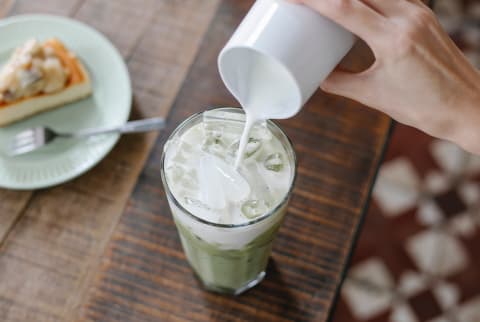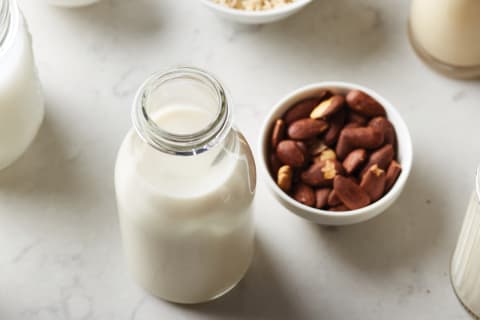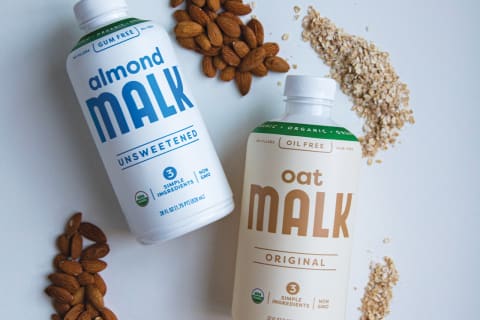Advertisement
Big Fan Of Alt Milks? This Expert Wants You To Know Something About Emulsifiers

Our gut microbiome influences digestion, nutrient absorption, vitamin synthesis, cardiovascular health, immune response, and mental health. And while lifestyle factors like sleep, exercise, fasting, and stress all cause changes to our microbiota, what we eat is by far the most influential and controllable lever we can pull in influencing our microbial health and, thus, our overall health.
Unfortunately, there is no check and balance in our food system to assess how food and food additives interact with our microbiome. Foods are generally regarded as safe (AKA—GRAS status1) by the FDA based on their toxicity to us, not our microbiota. And while extensive research shows that the quantity and diversity of plant-based foods promote a healthy and robust microbiome, we are just beginning to understand the safety and impact that additives like emulsifiers in our alternative milks have on our microbes. Because so much is unknown, I turn to products that are taking a stance against using these unnecessary additives like MALK and their delicious plant-based milks.
Considering the popularity of plant-based living coinciding with an explosion in alternative food innovation, we have to ask: What implications do emulsifiers have on our health, and why do we need them?
What are emulsifiers?
Emulsifiers are stabilizers between fat and water. Keeping them bound together creates uniform consistency, improves mouthfeel, and extends the shelf life of processed foods. You'll find them in condiments like salad dressing, premade coffee, plant-based milks and yogurts, protein drinks and bars, and even frozen treats to prevent ice crystals. When you want plants to taste like meat, cheese, milk, and yogurt, these additives do the trick—but are they worth it? We're ingesting more emulsifiers than ever, but the research is suggesting we should steer clear.
What does research tell us about them?
The publications on the harmful effects of dietary emulsifiers started in 2015, when a Nature article showed that dietary emulsifiers negatively affected the mouse gut microbiota promoting colitis and metabolic syndrome2. The study looked at relatively low concentrations of two commonly used emulsifiers, carboxymethylcellulose and polysorbate-80. It concluded that in just 12 weeks, these emulsifiers alter the microbiome, induce low-grade inflammation, and promote metabolic disease. Then, a 2019 study looked into mental health implications and concluded that dietary emulsifier consumption altered anxiety levels and social-related behaviors in mice3 showing an increase in anxiety-related behavior for male mice and a reduction in social behavior for female mice.
Human studies in the last two years are echoing animal studies, indicating emulsifiers may have a direct impact on the human gut microbiota and an induction in epithelial inflammation. A 2021 study published in Microbiome looked at the impact of 20 emulsifiers on microbiota and concluded that the vast majority, 18 of the 20, alter gut microbiota in a manner expected to promote intestinal inflammation. Carrageenans and gums altered microbiota density and composition and increased the expression of pro-inflammatory molecules the most whereas lecithins had the least impact.
Even still, emerging evidence suggests emulsifiers are breaking down intestinal barrier function and increasing antigen exposure, increasing the incidence of inflammatory bowel disease and metabolic syndrome. And while Crohn's patients have been encouraged to avoid emulsifiers in functional practice, a 2020 feasibility trial finally concluded that investigating the efficacy of a low emulsifier diet in Crohn's disease was warranted.

The bottom line.
The reality is gut dysbiosis is closely involved in the pathogenesis of inflammatory bowel disease, and we cannot continue to purchase convenient and plant-based alternative products without opening our eyes to the negative impacts on our microbiota, and thus our health. I coach my clients to check for minimal ingredients, swap for alternatives without emulsifiers, and get used to the performance differences.
For many of my clients, that's coaching them to take stock of what's in their fridge and lower their consumption especially on everyday offenders. That can be as simple as making the swap to an emulsifier-free nut milk in their smoothie, like MALK—a plant-based milk made with just three simple ingredients and containing no gums, oils, fillers, or artificial anything. I know they aren't sacrificing taste, and they won't notice a difference in their smoothie. That said, if they splash it in their coffee without an emulsifier, they'll notice separation—but I have educated them to understand one rule: If it doesn't separate, it's not great.

Why Nutrition Is Key To Changing Your Relationship With Alcohol
Brooke Scheller, DCN, CNS

Why Alcohol Sabotages Your Gut Health & How To Get Back On Track
Brooke Scheller, DCN, CNS

Why Nutrition Is Key To Changing Your Relationship With Alcohol
Brooke Scheller, DCN, CNS

Why Alcohol Sabotages Your Gut Health & How To Get Back On Track
Brooke Scheller, DCN, CNS

Why Nutrition Is Key To Changing Your Relationship With Alcohol
Brooke Scheller, DCN, CNS

Why Alcohol Sabotages Your Gut Health & How To Get Back On Track
Brooke Scheller, DCN, CNS

Why Nutrition Is Key To Changing Your Relationship With Alcohol
Brooke Scheller, DCN, CNS

Why Alcohol Sabotages Your Gut Health & How To Get Back On Track
Brooke Scheller, DCN, CNS
















